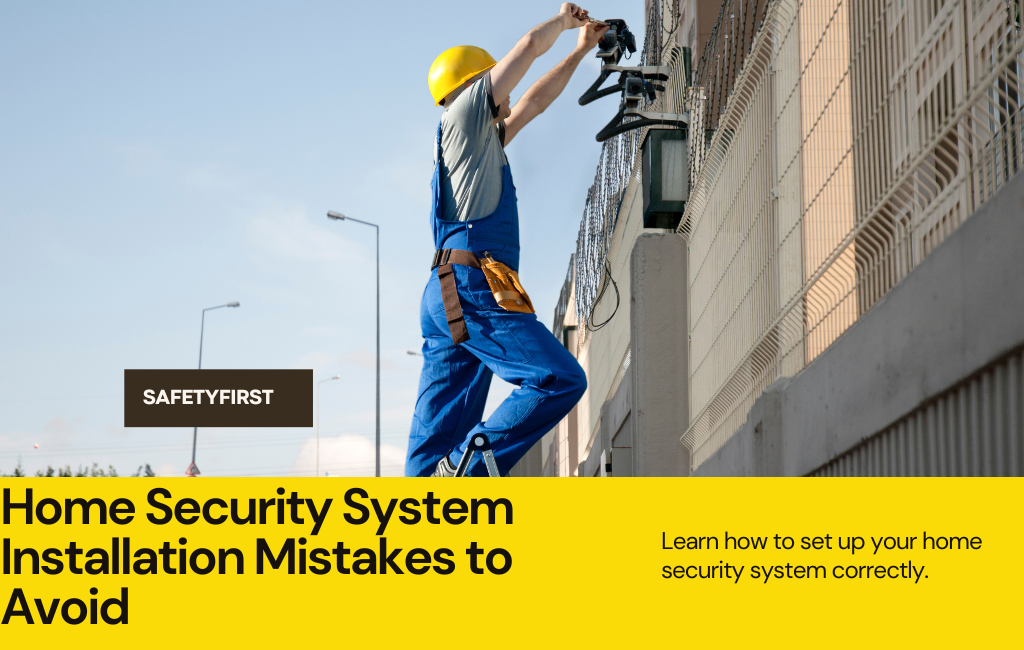What Are Some Common Mistakes to Avoid When Installing a Home Security System
Installing a home security system is an important investment that can provide peace of mind and protect your family and property from potential threats. However, many homeowners make common mistakes during the installation process, which can compromise the effectiveness of their security system. In this article, we’ll explore some of the most common pitfalls to avoid when installing a home security system.
1. Inadequate Planning
Failing to Conduct a Security Survey
One of the most critical steps in installing a home security system is conducting a thorough security survey. This involves identifying potential entry points, vulnerable areas, and any existing security measures. Failing to conduct a comprehensive security survey can lead to gaps in your home’s security coverage, leaving certain areas unprotected.
To ensure a successful home security system installation, it’s essential to assess your property’s unique layout, potential risks, and specific security needs. This will help you determine the appropriate type and number of sensors, cameras, and other security components required to provide comprehensive protection.
Not Considering Future Expansion
When planning your home security system, it’s important to consider potential future expansion needs. As your family grows or your living situation changes, you may need to add additional sensors, cameras, or other components to your existing system. Failing to plan for future expansion can result in a system that is difficult or costly to upgrade down the line.
To avoid this mistake, choose a home security system that is scalable and can accommodate future additions or modifications. Look for systems that offer a wide range of compatible components and allow for easy integration of new devices.
2. Choosing the Wrong Type of System
Wireless vs. Wired Systems
Home security systems can be broadly categorized into two types: wireless and wired systems. Each type has its own advantages and disadvantages, and choosing the wrong one for your specific needs can lead to inefficiencies or compromised security.
Wireless systems offer greater flexibility and ease of installation, as they don’t require running cables through walls or ceilings. However, they can be susceptible to signal interference, battery life issues, and potential hacking attempts. Wired systems, on the other hand, are generally more reliable and secure, but their installation can be more invasive and costly.
When selecting a home security system, consider factors such as the size of your property, the layout of your home, and your budget. For larger homes or properties with complex layouts, a wired system may be more suitable, as it can provide a stronger and more stable connection over longer distances.
Overreliance on Wireless Systems
While wireless home security systems offer convenience and flexibility, it’s important not to rely solely on them. Wireless systems can be vulnerable to signal interference from other electronic devices or environmental factors, which can disrupt their performance and leave your home unprotected.
To mitigate this risk, consider incorporating a combination of wired and wireless components into your home security system. This approach can provide the benefits of both technologies while minimizing their respective drawbacks.
3. Poor Equipment Selection
Undersizing Needs
When selecting security equipment for your home, it’s crucial to avoid undersizing your needs. This mistake can lead to inadequate coverage, poor image quality, or insufficient protection. Factors such as the size of your property, the number of entry points, and the specific areas you want to monitor should guide your equipment selection process.
Consult with security professionals or conduct thorough research to determine the appropriate number and type of sensors, cameras, and other components required for your home’s unique security requirements.
Using Low-Quality Equipment
While it may be tempting to opt for cheaper, low-quality security equipment to save money upfront, this decision can prove costly in the long run. Low-quality cameras and sensors may produce poor image quality, have limited functionality, or fail prematurely, compromising the effectiveness of your home security system.
Invest in high-quality equipment from reputable manufacturers to ensure reliable performance, durability, and optimal protection for your home. Look for cameras with high resolution, night vision capabilities, and weather resistance if they will be installed outdoors.
4. Incorrect Installation Techniques
Improper Placement of Cameras and Sensors
The placement of cameras and sensors is crucial for ensuring comprehensive coverage and maximizing the effectiveness of your home security system. Common mistakes include positioning cameras too high or too low, obstructing their field of view, or failing to account for potential blind spots.
To avoid these pitfalls, follow best practices for camera and sensor placement. Cameras should be installed at an appropriate height (typically 8 to 10 feet above the ground) and positioned to provide clear, unobstructed views of entry points, high-traffic areas, and potential blind spots. Sensors should be placed strategically to detect motion and activity in critical areas.
Failing to Secure Devices Properly
Another common mistake is failing to secure security devices properly. Cameras and sensors that are not securely mounted or installed can be easily tampered with or dislodged, rendering them ineffective. This can leave your home vulnerable to potential threats.
To prevent this issue, ensure that all security devices are securely mounted using appropriate hardware and techniques. Avoid using adhesives or temporary mounting solutions, as these can be easily compromised. Additionally, consider concealing wires and cables to prevent tampering or accidental damage.
5. Ignoring Compatibility Issues
Mixing Incompatible Devices
When installing a home security system, it’s important to ensure that all components are compatible with each other. Mixing incompatible devices from different manufacturers or systems can lead to integration issues, communication failures, or reduced functionality.
Before purchasing any security equipment, carefully research the compatibility requirements and ensure that all components are designed to work seamlessly together. Consult with security professionals or refer to manufacturer guidelines to avoid compatibility issues.
6. Neglecting Regular Maintenance
Skipping Routine Checks
Like any other technology, home security systems require regular maintenance to ensure optimal performance and longevity. Neglecting routine checks and maintenance can lead to system failures, false alarms, or compromised security.
Establish a regular maintenance schedule that includes tasks such as testing sensors and alarms, checking battery levels, and inspecting wiring and connections. Additionally, keep an eye out for any software updates or firmware upgrades that may be released by the manufacturer, as these can address security vulnerabilities or introduce new features.
Ignoring Environmental Factors
Environmental factors such as weather conditions, temperature fluctuations, and exposure to the elements can impact the performance of your home security system, particularly for outdoor components like cameras and sensors.
To mitigate these risks, ensure that outdoor equipment is properly weatherproofed and protected from the elements. Additionally, consider the operating temperature range of your devices and take steps to insulate or protect them from extreme temperatures.
7. Overlooking Professional Help
When to Opt for Professional Installation
While some homeowners may be tempted to install their home security system as a DIY project, there are situations where professional installation is highly recommended. Complex systems, large properties, or homes with unique layouts may require the expertise of a professional installer to ensure proper configuration and optimal performance.
Professional installers have the knowledge and experience to assess your specific needs, recommend appropriate solutions, and properly install and configure your home security system. They can also provide valuable guidance on system maintenance and troubleshooting.
8. Common User Errors
Improper Use of Passcodes
One of the most common user errors when it comes to home security systems is the improper use of passcodes or access codes. Sharing passcodes with unauthorized individuals or using easily guessable codes can compromise the security of your system and leave your home vulnerable.
To mitigate this risk, follow best practices for passcode management. Use strong, unique passcodes that are difficult to guess, and avoid sharing them with anyone who doesn’t have a legitimate need for access. Additionally, consider changing passcodes periodically to enhance security.
Failing to Educate Household Members
Another common mistake is failing to educate all household members on the proper use and operation of the home security system. Each member of your household should be familiar with how to arm and disarm the system, respond to alarms, and understand the basic functionality of the various components.
Neglecting to provide proper training can lead to user errors, false alarms, or even compromised security if the system is not used correctly. Take the time to educate all household members and provide clear instructions or user manuals for reference.
9. Not Utilizing Monitoring Services
Benefits of Professional Monitoring
While self-monitoring your home security system can be a cost-effective option, it’s important to consider the benefits of professional monitoring services. Professional monitoring companies provide 24/7 monitoring and rapid response in the event of an alarm or security breach.
With professional monitoring, trained personnel can quickly assess the situation, dispatch emergency services if necessary, and potentially deter or apprehend intruders. This added layer of protection can provide peace of mind, especially when you’re away from home or unable to respond to an alarm promptly.
Invest in a Home Security System Today!

Installing a home security system is a significant investment in the safety and protection of your family and property. By avoiding the common mistakes outlined in this article, you can ensure that your home security system is installed correctly, functions optimally, and provides the comprehensive protection you need.
Remember to conduct thorough planning, choose the right system and high-quality equipment, follow proper installation techniques, and consider professional help when needed. Additionally, prioritize regular maintenance, educate household members, and explore the benefits of professional monitoring services.
By taking these precautions and following best practices, you can maximize the effectiveness of your home security system and enjoy the peace of mind that comes with knowing your home is well-protected.
